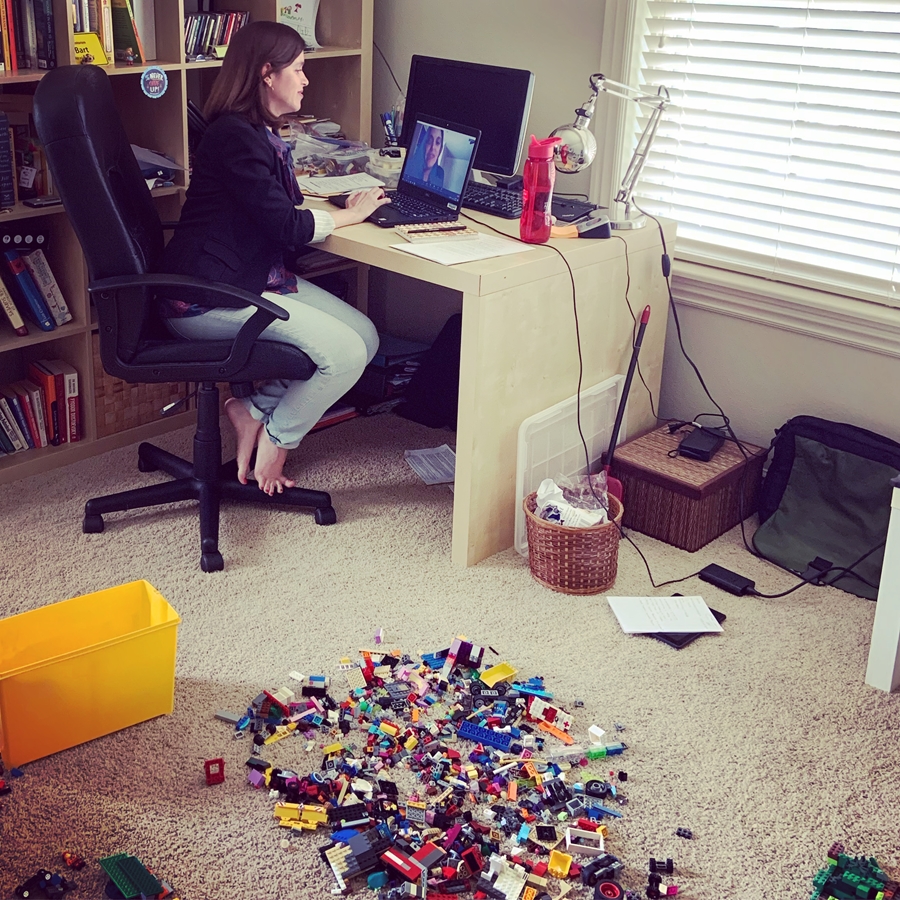Job losses, childcare duties and mental distress have disproportionately affected women since the coronavirus pandemic began, according to research by University of Arkansas professor Gema Zamarro.
Zamarro teaches in the Department of Education Reform in the U of A College of Education and Heatlh Professions. She's also an adjunct senior economist for the University of Southern California's Center for Economic and Social Research. She co-authored the research brief on "Gender Differences in the Impact of COVID-19" with USC colleagues Francisco Perez-Arce and Maria Prados.
Zamarro, a mother with young children ages 7 and 9, initiated the study after hearing anecdotal evidence about the gender divide related to COVID-19. She was also starting to notice the stress on a personal level.
"This has been a very hard time for me with having to move classes online and school closures," she said. "It has been difficult to keep up with my work while providing care and homeschooling for my two kids. I observed in social media how many working moms like me were struggling and thought this was an important effect of the pandemic that needed more study.
"I believe this could have important future consequences for gender equality."
USC's Understanding Coronavirus in America Study found that women, particularly those without a college degree, suffered more job losses than men and handled significantly greater responsibility for childcare during the pandemic.
One-third of working mothers in two-parent households reported they were the only ones providing care for their children, compared to one-tenth of working fathers. Higher levels of psychological distress also emerged among women with children, compared to women without children and to men with or without children.
Zamarro said there are several reasons the current COVID-19 crisis and the coinciding recession have disproportionately affected women.
First, the pandemic has devastated service-oriented sectors that employ more women like restaurants, hotels and hospitality, leading to more job losses, she said. Secondly, as schools and daycares closed and as stay-at-home orders made it difficult for family members like grandparents to help, childcare needs soared.
"Considering women already shouldered a greater burden for childcare prior to the pandemic, it's unsurprising the demands are now even greater," Zamarro said. "While men are more likely to die from infection by COVID-19, overall the pandemic has had a disproportionately detrimental impact on the mental health of women, particularly those with kids."
Moms reported a huge spike in psychological distress in early April, compared to women without kids and to all men. The level steadily eased through early June to pre-pandemic levels, but women remain disproportionately impacted.
The analysis also found that more women than men took on childcare duties after schools closed in response to the coronavirus: 44% of women in early April reported being the only household member providing care, compared to 14% of men.
The disparity was notable among working parents, including those working from home: 1 in 3 working mothers in early April reported that they were the main caregiver, vs. 1 in 10 working fathers.
Since the start of the pandemic, less-educated women have suffered the greatest job losses, the results show. They suffered a 15 percentage-point drop in employment in early April compared to March. Men without college degrees during that same period experienced an 11-point drop.
Although states, counties and cities are reopening, as of early June, just 41% of non-college educated women and 46% of men were employed.
Meanwhile, college-educated men and women are experiencing job losses at similar rates. Employment for both dropped from about 74% to 67%.
Working college-educated mothers also reduced their working hours compared to women who have no young children and in comparison to men. The drop in work hours was the greatest among college-educated parents of young children. By early June, 64% of college-educated mothers reported that they had reduced their working hours at some point since March, versus 36% of college-educated fathers and 52% of college-educated women without young children.
Zamarro said the Center for Economic Research will continue to collect data for the Understanding Coronavirus in America Study.
"I plan to continue with this research and to follow these respondents in the coming months as schools may or may not be able to open and remain open in the fall," she said. "The fact that we observe college-educated moms reducing working hours is worrisome as it might imply that if the situation continues some moms might decide to leave the labor force to provide the necessary care."
A total of 6,824 members of the probability-based Understanding Coronavirus in America study participated in six tracking survey waves from March 10 through June 16, 2020.
Sample sizes and margins of sampling error for the populations in this release are available in the full study report.
Zamarro holds the Endowed Chair in Teacher Quality.
Topics
Contacts
Gema Zamarro Rodriguez, Endowed Chair in Teacher Quality
Education Reform
479-575-7024, gzamarro@uark.edu
Shannon Magsam, director of communications
College of Education and Health Professions
479-575-3138, magsam@uark.edu
